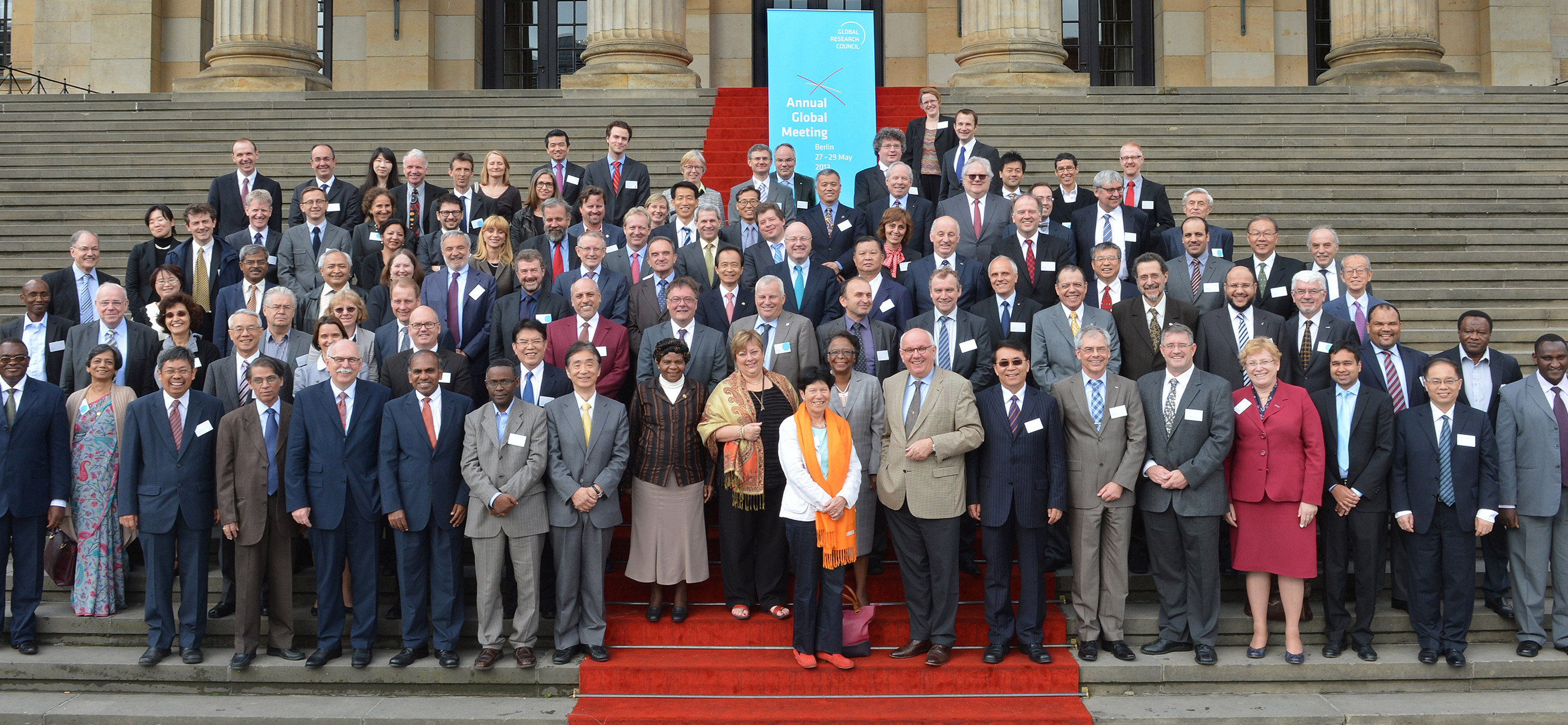2013 Annual Meeting

On 29 May 2013, the 2nd Annual Global Meeting of the Global Research Council (GRC) in Berlin has ended. Over three days, the heads of about 70 science and research councils from around the world as well as high-ranking guests from science and research, science administration and research policy attended the meeting. The topics of discussion and endorsement were an Action Plan towards Open Access, a high-level Statement of Principles for Research Integrity as well as new statutes for the GRC. Hosted jointly by the German Research Foundation (DFG) and the National Council of Technological and Scientific Development (CNPq) of Brazil, the 2nd Annual Global Meeting was the largest of its kind so far and represented some 80 percent of the world’s public, non-ministerial research potential.
The outcomes of the meeting’s discussions as well as the endorsed documents were presented at a press conference on 29 May 2013 in the Berlin-Brandenburgische Akademie der Wissenschaften in Berlin. DFG-President Professor Peter Strohschneider stressed the relevance of “Open Access” to publications as a main paradigm of scientific communication in the following years. The participants agreed that sharing research publications openly is a means to increase the quality of research communication and thus of research itself. The endorsed Action Plan includes activities by which GRC member organisations can foster the open exchange of research results with a high degree of flexibility. Therefore the plan specifies three basic principles: encouragement, awareness rising, and support for researchers that wish to provide their results in Open Access. The implementation requires engaging a number of stakeholders: in addition to scientists and scholars themselves, for instance, universities, science organisations, libraries, and publishers. The endorsed Principles for Research Integrity point out that researchers and institutions themselves remain ultimately responsible for undertaking research with integrity. On the other hand, research funding agencies have an obligation to ensure that supported research corresponds to the highest standards possible, as CNPq-President Professor Glaucius Oliva stated.
Both the Action Plan and the Principles for Research Integrity had been developed at a set of regional meetings held around the world since autumn 2012. “Research integrity and Open Access are two topics of high complexity and with ramifications for all funding agencies. In the light of that, the two agreements appear the more remarkable”, DFG-President Strohschneider concluded.
Strohschneider also pointed out the presence of many international, high-level representatives as evidence of their work in support of enhanced collaboration across the international research community: “It has been our goal and a pleasure to bring together the world of research and research funding to Berlin.” For the DFG, he said, the Annual Meeting 2013 was an opportunity to draw the world’s attention to our own standards and the German model of research funding which is based solely on criteria of scientific and scholarly quality and free from political, economic, or other reasoning.
The Annual Global Meeting 2013 of the GRC comprised a meeting of the Governing Board and the International Steering Committee. The DFG-hosted conference dinner on 28 May at the Deutscher Bundestag was joined by Professor Johanna Wanka, the German Federal Ministry of Education and Research, and Dr. Dorothee Stapelfeldt, Senator for Science and Research of Hamburg.
The Global Research Council is a voluntary, informal organisation of heads of research councils (HORCs) from around the world, pledged to find mutually acceptable paths to greater interna-tional research collaboration. Its goal is to represent most of the world’s research potential by getting all interested key players in research and research funding worldwide involved. To ensure a globally consultative process and to improve communication and cooperation among research funding agencies, the GRC annually holds a set of regional meetings as well as an annual global meeting to gather input from the different world regions, address issues of mutual concern to research and research funding worldwide, and to agree on guidelines and principles by which multinational research collaboration can be enhanced. Thereby, the GRC shall also provide assistance to those research institutions and funding organisations wishing to build a world-class research landscape.
The Global Research Council was established in May 2012 at the “Global Summit on Merit Re-view” held in Washington, DC. On invitation of the U.S. National Science Foundation (NSF) about 50 HORCs endorsed a high-level Statement of Principles for Scientific Merit Review. Former NSF-Director Dr. Subra Suresh and former DFG-President Professor Matthias Kleiner played key roles in launching the GRC and both were present at the Berlin meeting.
The Annual Global Meeting 2014 will take place in Beijing hosted by the Chinese Academy of Sciences (CAS) and the Natural Sciences and Engineering Research Council of Canada (NSERC). At the press conference CAS-President Professor Bai Chunli and NSERC-Vice-President Isabelle Blain invited scientists, scholars, and research funders from all over the world to Beijing.
Further Information
Media Contact
Marco Finetti
Head of Press- and Public Relations
German Research Foundation (DFG)
phone: +49 228 885-2230
Marco.Finetti@dfg.de
Additional Point of Contact for International Media Enquiries
Dr. Paulo Sérgio Lacerda Beirão
CNPq
phone: +55 61 3211-9933
beirao@cnpq.br
Dana Topousis
National Science Foundation (NSF)
phone: +1 703 292-7750
dtopousi@nsf.gov
More detailed information on the Global Research Council as well as its Annual Meeting in Berlin can be found at
www.globalresearchcouncil.org
www.dfg.de/grc2013
On this website a live recording of the press conference as well as the endorsed documents will be available.
